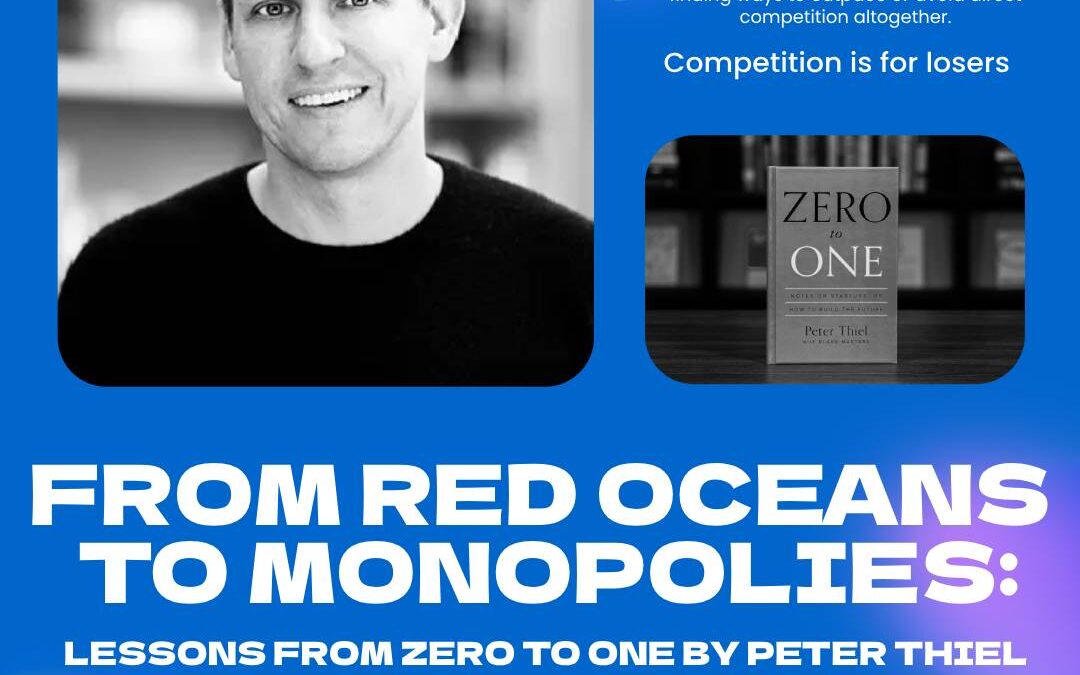
From Red Oceans to Monopolies: Lessons from Zero to One by Peter Thiel
Peter Thiel, one of the greatest investors of our time—co-founder of PayPal, early investor in Facebook (now Meta), and author of Zero to One—shares a striking insight about business:
“Competition is for losers.”
This sounds bold, right? But here’s the core idea: Companies often fear competition so much that they end up in “red oceans,” where they’re constantly fighting for survival against countless rivals. In contrast, truly successful businesses—those that achieve a monopoly—operate in “blue oceans,” where they are free to dominate their markets with little to no competition.
Red Ocean vs. Blue Ocean
The concept of a red ocean versus a blue ocean comes from the Blue Ocean Strategy framework, which suggests that most companies compete in markets full of fierce competition—”red oceans”—which are red because of the blood in the water from cutthroat rivalry. In contrast, blue oceans represent untapped market spaces where competition is irrelevant because the company is offering something new or vastly different.
What’s particularly fascinating is how companies portray their market position. Companies with monopolies often downplay their dominance to avoid drawing attention or scrutiny. They will say things like, “There are many other companies doing exactly what we do.” This helps them fly under the radar and avoid regulatory pressure that monopolies tend to attract.
On the other hand, companies stuck in competitive markets do the opposite—they exaggerate how unique or different they are, even if they’re struggling to stand out. They feel pressured to prove their value proposition and justify why they deserve a share of the crowded market.
The Value of Creating a Monopoly
Thiel argues that aiming for a monopoly isn’t just about seeking dominance; it’s about creating something so unique, so valuable, that no one else can truly replicate it. Think of companies like Google, Amazon, or Tesla—businesses that didn’t just enter existing markets but carved out entirely new paths and redefined their industries. Google revolutionized how we access information. Amazon reimagined how we shop. Tesla didn’t just build electric cars; it made electric cars desirable and proved that the future could be both sustainable and exciting.
Why Monopolies Matter
The idea of building a monopoly might sound negative, but Thiel’s perspective is that monopolies are often a reflection of a company’s success in innovation. When you build a product or service that’s truly exceptional and solve a problem in a way no one else can, you naturally move towards being the only one in your space. This allows for better profitability, market stability, and the freedom to innovate further without constantly looking over your shoulder at competitors.
Moreover, monopolies create opportunities to think long-term. When a company isn’t forced to worry about competitors constantly trying to undercut them on price or features, it can focus more on making significant innovations, improving its offerings, and benefiting customers over the long run.
Moving from a Red Ocean to a Blue Ocean
If your company is currently struggling in a red ocean, ask yourself: What can we do differently to stand apart? How can we deliver so much value that we essentially create our own market—our own blue ocean?
It might mean focusing on a niche that has been ignored, reimagining how a product or service is delivered, or even solving a problem that customers didn’t realize they had. The companies that achieve monopoly-like success are the ones that ask these questions and are willing to take risks to build something entirely new.
Solvait: Creating a Blue Ocean
At Solvait, we never wanted to put ourselves at risk of fierce competition. Instead of entering a crowded market, we aimed to create something truly new and innovative. We wanted to build a solution that complemented, rather than competed with, our partners. This goal required a lot of effort and determination, but it also opened up a unique space for us in the industry.
We worked hard to introduce a new model of an independent software vendor (ISV) on top of Microsoft Dynamics 365 to the community in Saudi Arabia, the Gulf region, and the entire Middle East. It was not easy to carve out this new path—there was no clear market for what we were offering at the beginning. We had to educate the community, show them the value of our approach, and build trust over time.
But this journey allowed us to create our own blue ocean. We weren’t just another vendor offering standard solutions. We developed unique products and services that added significant value to our clients, without directly competing against our partners. By aligning with Microsoft Dynamics 365 and establishing ourselves as a complementary partner rather than a competitor, we were able to create a market that we could call our own.
Key Takeaway
Don’t get caught in the cycle of fighting for scraps in crowded markets. Instead, aim to create something extraordinary—something that sets you apart so significantly that you essentially have no competitors. Build something unique, valuable, and irreplaceable. Aim to create your own monopoly—a market you own.
Your Thoughts?
What do you think? Are you currently competing in a red ocean, or are you working to create your own blue ocean? Let’s discuss in the comments!
#ZeroToOne #Monopoly #Innovation #BusinessStrategy #PeterThiel #Leadership

